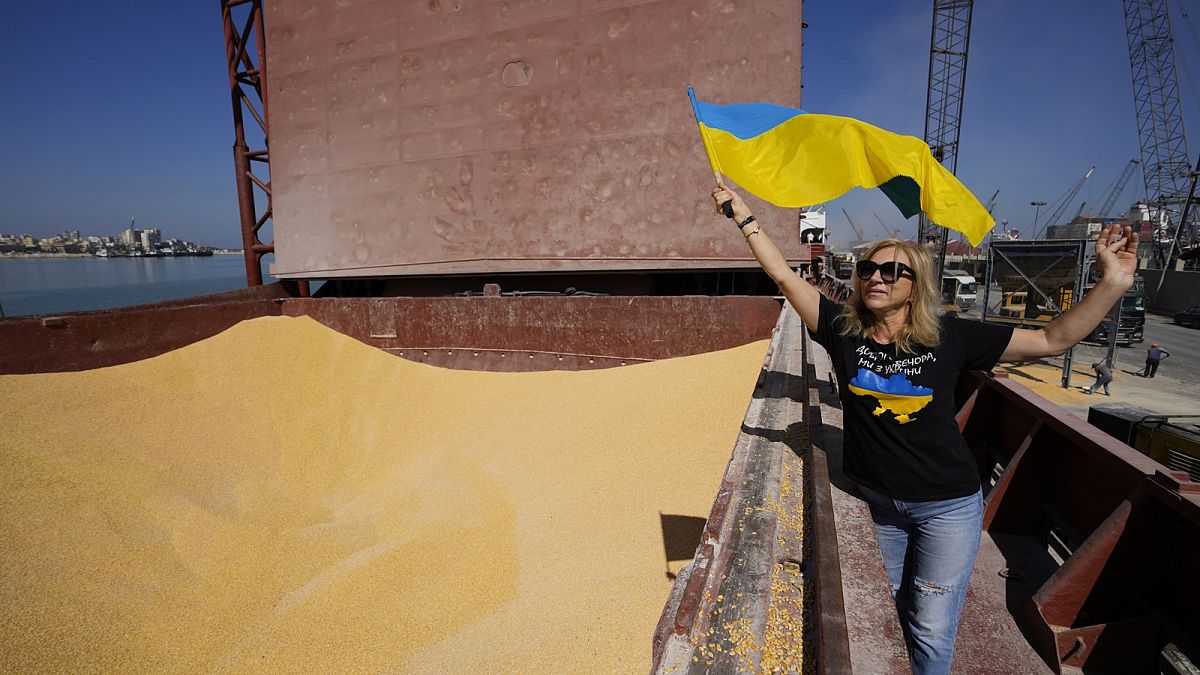Kyiv and Bratislava on Thursday struck a preliminary deal to resolve the ongoing dispute over Ukrainian cereals.
Both countries have agreed to step up a new system to control the flow of the four Ukrainian products that are currently blacklisted under Slovakia's unilateral ban: wheat, maize, rapeseed and sunflower seed.
The breakthrough came after a virtual meeting on Wednesday between Jozef Bíreš, Slovakia's minister of agriculture and rural development, and his Ukrainian counterpart, Mykola Solskyi.
The ministers "agreed on the developing of a grain trading system based on the issuance and controlling of licenses," the Slovak ministry said in a statement to Euronews.
"Until this system is launched and its full operation is tested, the ban on the import of four commodities from Ukraine, which was approved by the Government of the Slovak Republic as of September 16, continues to apply until the end of 2023."
Bíreš asked Solskyi to remove Slovakia from the lawsuit Ukraine filed earlier this week before the World Trade Organization.
Solskyi agreed to cease the legal action, the statement said, and to refrain from making any threats about a tit-for-tat ban on Slovakian foodstuffs.
No more details about the trading system were provided.
The unexpected agreement leaves Poland and Hungary as the only two European Union member states intent on continuing their prohibitions on Ukrainian commodities, a trade dispute that is testing the limits of the bloc's solidarity with the war-torn nation.
The on-and-off conflict dramatically escalated over the weekend after the European Commission decided on Friday to lift the restrictions that had applied to Poland, Hungary, Slovakia, Romania and Bulgaria since 2 May.
Under those bans, the transit of wheat, maize, rapeseed and sunflower seed was allowed through the five Eastern countries but not the sale and storage in their domestic markets. The measures, which were extraordinary in nature and highly controversial, were meant to avoid market disturbances caused by the influx of tariff-free, low-cost cereals.
Upon examining economic data, the Commission concluded the bans were no longer necessary and chose to phase them out. In return, Kyiv agreed to submit an "action plan" to tighten surveillance over its own agricultural exports and avoid new surges.
The compromise was criticised by Poland, Hungary and Slovakia, who rapidly moved to impose new bans in a unilateral and uncoordinated manner. Meanwhile, Romania and Bulgaria refrained from any retaliatory action, despite pressure from their farmers.
The intensifying feud reached the halls of the United Nations General Assembly during a fiery speech by President Volodymyr Zelenskyy.
"It is alarming to see how some in Europe, some of our friends in Europe, play out solidarity in a political theatre – making a thriller from the grain," Zelenskyy said on Tuesday. "They may seem to play their own role but in fact, they are helping set the stage (for) a Moscow actor."
Zelenskyy's accusatory words infuriated Poland, who then announced it would halt new deliveries of weapons and ammunition to the war-torn nation.
Possible legal action
As news of the Ukrainian-Slovak deal broke on Thursday, the European Commission raised the prospect of initiating legal action against those member states that still have prohibitions in place in order to ensure compliance with EU law, which places trade policy under the Commission's exclusive competence.
"The Commission, at one point, reserves its rights, if necessary, to launch an infringement procedure against those countries that have introduced unilateral bans," the spokesperson said on Thursday afternoon, adding: "We're not at that point yet."
"The scenario we're aiming for is to find constructively a new solution to implement the new framework."
The spokesperson noted work was underway to enforce the "action plan" submitted on Monday by Kyiv, which includes a "verification and control system that should be implemented swiftly."
Once the plan is in full effect, "we will see no need to have unliteral bans."
Should it launch an infringement procedure, the executive could find itself as both a plaintiff against Poland and Hungary and their defender, as it will have to represent the two countries against Ukraine before the WTO, even if their actions run contrary to the common line of action. The lawsuit filed by Kyiv is still in the early stages of consultations.
